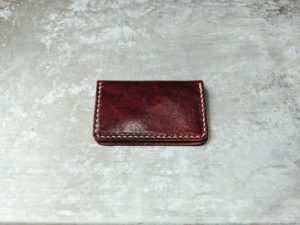
The other day, I left the house and realized, once I had arrived at the subway station, that I had forgotten my wallet. If I went back home, I would have been late for an appointment with a client, so I was stuck. I had about $1.50 in my purse and it cost $2.25 to get on the subway so I had to ask a complete stranger for a dollar. He gave it to me without hesitation.
When I arrived at my client’s office, I realized with anxiety that this was a building in which visitors have to show identification to be admitted access. Not having my wallet, I was not only without money, but without identification as well. I approached the security guard with a pained expression on my face and explained why I could not show my identification. Without even calling the client to confirm that I was a legitimate visitor to the building, the guard allowed me access without skipping a beat.
To get home, I had to borrow carfare money from my client (a bit embarrassing). As I walked back home from the subway station, remembering that I had no money on me, I thought to myself, I’ll just go to the bank and get some cash. It took a moment for me to realize that since I didn’t have my wallet, I was not only without cash, but was without a bankcard as well.
This experience provided a stark picture of the privilege that I, as a middle class white woman, am able to take for granted that many others cannot. Had I not been white and dressed in business attire, I might not have been given the dollar that enabled me to get on the subway. Similarly, it is not likely that I would have had such an easy time passing through security at my client’s office if I were a Muslim woman wearing a veil. And while it was a bit of an inconvenience not being able to access my bank account without my bankcard, I was not faced with having no access to cash whatsoever.
What are the privileges you take for granted?

Deb,
Thank you for sharing this reflection and for posing this question for others to consider.
I recognize that I often benefit from my male privilege. The assumption of my strength – physical and emotional; the relative feeling of safety when walking the streets or solo hiking in the forest. There are many other manifestations of male privilege but for me many of them are diminished or overridden by the fact that I am a black man.
I feel that is is important for us all to reflective and acknowledge the ways that we benefit from the privileges afforded us by aspects of our identities within this unjust society. I believe it is also important to honestly address the historical and ongoing giving of privileges, access and resources to one group over others – specifically white privilege. In my experience, this is a very challenging issue to face for white folks – particularly males – who struggle with real feelings of shame, blame and guilt. This is an unavoidable part of the process toward becoming a voice for equity. Unfortunately many people exercise their white privilege to avoid the conversation altogether or to frame and temper the language – the truth of others – to make it less uncomfortable for them. When we scale this up, we begin to see more clearly the systems of privilege that define our society.
The point of this challenging work is not only to see and acknowledge our own privilege, but to develop the will and the ability to call it out in the moment, share it in service to others and liberate ourselves from being active or unwitting oppressors. Perpetuating the systems of privilege hurt everyone.
Blessing to a of you on your journey. Thank you for doing the work.
Maketa,
So wonderful to hear from you. Thank you for sharing your thoughts.
As you said, for white people, acknowledging our unearned privileges can bring a lot of shame and guilt. I have discovered that shame and guilt are neither effective nor empowering and can paralyze people into inaction.
I try to acknowledge my white privilege, to interrupt it when I can and to use in service of justice whenever possible.
Blessings to you too.
Deb